Recently, Jesuit’s own Mr. Brian Goll became the next doctor to join Jesuit’s growing roster. Dr. Goll has been a beloved part of the Jesuit English Department for years, and I was fortunate enough to gain an exclusive interview with him to discuss the ins and outs of the doctorate process. I will also be diving into his personal motivations and the methods he used to stay on top of a heavy workload.
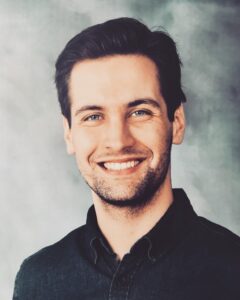
The Decision
The first question to ask a newly certified doctor is obvious: “Why did you decide to make this difficult journey to become a doctor?”
Dr. Goll began by discussing his passion for the pursuit of knowledge. Like any good educator, Dr. Goll is excited by academic challenges, and a PHD program is a great option for those who want to be intellectually stimulated.
Dr. Goll was also quick to point out the importance of his supportive environment in the decision making process. Not only did he have the support of his family behind him, but also that of his colleagues here at Jesuit. Dr. Goll spoke with members of his department; consulted other doctors, including Dr. Degen; and even spoke with, and was supported by, the Jesuit administration. Dr. Goll thanked Mr. Garrison and Mr. Erasing by name, and repeatedly mentioned his gratitude towards the nurturing environment Jesuit provided, and the importance of that supportive atmosphere in the decision to pursue his dream. According to Dr. Goll, “I knew that if I were to attain this degree, or accomplish this degree, the very supportive, nurturing environment of Jesuit was going to be the exact kind of professional environment that would be most beneficial to attain that goal.”
Finally, Dr. Goll referenced the importance of prayer in his decision making. As a Catholic, he emphasized the importance of God not only in his discernment process as he was making the decision to pursue this prestigious degree, but also in helping him complete the degree in full while juggling his job as a teacher and still making time for himself, family, friends, etc.
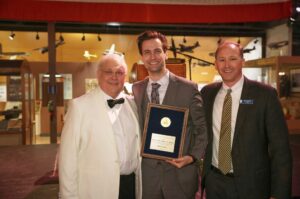
The Process
For Dr. Goll, the PhD process took about 3 and a half years in total, studying in the Baylor EDD program. The classes were split between online and in person, about 75% and 25% respectively. While in the middle of these classes, Dr. Goll was also researching and writing his dissertation, a challenging workload.
The day to day was just as daunting, spending two to three hours on research every single night. This was on top of other obligations, such as his full time job as one of Jesuit’s top English teachers and time spent with friends and family. He noted that this was a laborious process, and one that became very difficult at times.
Dr. Goll remarked that oftentimes he stayed at school taking classes online in his office or staying late to research. These long hours began to take a toll, and eventually he decided he needed a break. In the spring semester of 2024, Dr. Goll took some time to recuperate. He realized that, in order to finish strong, taking care of himself was important.
The Dissertation
One of the most important aspects of any doctoral program is the dissertation. This, of course, leads us to an important question: what is Dr. Goll’s dissertation about?
Dr. Goll’s dissertation centers on the idea of teacher feedback on student writing. This is a topic that many people from Jesuit, students in particular, can understand. In fact, Dr. Goll used his experience at Jesuit as the foundation of his writing.
In addition to his own research, Dr. Goll used the CEA as a resource for his dissertation. He even used the English Coach’s Playbook — written by Dr. Degen and Mr. Berry. Dr. Goll noted in the interview that “their research was so helpful for me going into and seeing what were some of the studies they used to support their findings as well.”
One surprising idea that came out of my interview with Dr. Goll was that the process of writing a dissertation is usually not fun. Dr. Goll himself said to me “I wont lie to you and say it was easy and always enjoyable, but there was always an understand of the larger significance of the larger purpose behind the work.”
According to Dr. Goll, writing a dissertation can be grueling work, requiring long, focused hours and an unrivalled dedication. However, since the dissertation requires you to add to the literature base in some meaningful capacity, there is a sense of duty and accomplishment in writing the paper.
The Personal Impact
He often used Jesuit as the context for his research. Additionally, he enlisted teachers from Jesuit to participate in his research. Dr. Goll noted that utilizing the perspectives of other teachers broadened his own perspective. While his own professional experience was vital to his work, the perspectives of his coworkers was instrumental in highlighting different ways in which teacher feedback can affect students and their work.
He describes the experience of compiling the final data as “rewarding.” Dr. Goll noted that he “felt like I was just continuing to learn how to give better feedback on student writing because I was extracting all these pearls of wisdom that my participants, or a.k.a. my colleagues, had provided me.”
The Role of Faith
The Godly Guys
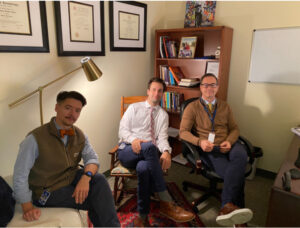
One of Dr. Goll’s biggest support groups was Godly Guys. This was one of Jesuits religious clubs. Dr. Goll was deeply involved with this community, and they offered substantial emotional and religious support.
Dr. Goll remarked that many students would ask him about his doctorate. They would ask when they would finally get to call him Dr. Goll. This constant barrage of support uplifted him.
Dr. Goll said that his journey to acquire his doctorate was tumultuous. However, the support of the students and faculty in Godly Guys was a vital line of support. He mentioned that Mr. Ellis in particular was a key player, keeping him grounded in his faith.
Identity
Dr. Goll mentioned that, especially in our modern world, “it is so easy to conflate what you do with who you are.” To illustrate this point, he describes a Jesuit student who “[didn’t] make the team, … [didn’t] make the grade.” He describes how this can lead to their sense of identity crumbling. This especially resonated with me as someone who centers much of their identity on their grades.
He mentioned how this same fracturing of identity happened to him while writing his dissertation. “I felt that identity crisis while pursuing this degree. You know, kind of have that very self-defeating inner voice of lie, you really have what it takes? Can you do this? Are you biting off more than you can chew? Are you sure you’re able to get to this finish line?” Dr. Goll told me that this onset of doubt was when faith began to play a central role.
Its important to note that the role faith played in his journey was not merely internal. In fact, Dr. Goll mentioned to me that “throughout this doctoral journey, I was always encouraged by my friends and colleagues here, but also by my family, to use thus time to really try to understand who God’s calling you to be.”
John 16:33
Dr. Goll mentioned a specific verse — John 16:33. In this verse, Jesus says to the disciples “In this world you will have trouble. But take heart! I have overcome the world.” This verse resonated deeply with Dr. Goll. He often found himself wondering why he had intentionally chosen this “intellectual difficulty.”
However, coming back to this verse often comforted Dr. Goll. He said that the realization the Christ has overcome great odds enlightened him. He realized that, with God’s help, he too can overcome great challenges.
The Experience
The Community
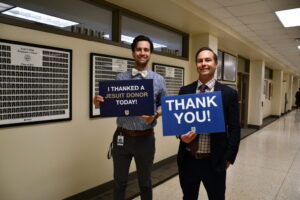
If there was a common theme throughout the interview, it was Dr. Goll’s gratitude towards the community that supported him. He repeated again and again how the outpouring of love and support from his fellow teachers, family members and friends truly motivated him to succeed.
This support has led to Dr. Goll wanting to pay it forwards. He me that his “hope is that as I continue the work that we do here at Jesuit, that I find ways in which I’m able to use this degree to love and serve others and to grow in humility and to grow in compassion and understanding for others.” Dr. Goll has a deep desire to use his degree to help those around him. In fact, Dr. Goll aspires to inspire others seeking their doctorate, saying to me “I can’t wait to be a source of encouragement for them and to pay it forwards that way.”
Dr. Goll is grateful to the entire Jesuit community. He thanks Mr. Garrison and Mr. Earsing for their continued support, guidance, and mentorship. He thanks his fellow faculty members for their help in his research and encouragement. And finally, he thanks his family for offering a shoulder he can lean on.
The Student Experience
According to Dr. Goll, one unexpected product of his time as a Ph.D. student was an increased empathy for his students. During his time as a student, he grew to appreciate the frustrations of us novice writers. Although his work was much more nuanced, he still grew in his understanding of the naive student.
Dr. Goll also noted that over time, this reminder of the student experience has shaped his efforts in meeting with students. He was able to channel his own student experience towards teaching the next generation.
The Personal Connection
Once the process was finalized, Dr. Goll received an “outpouring of love and support” from friends, faculty, family, etc. He recalls being extremely moved at the congratulations and support he received. His friends, family, and coworkers all congratulated him on his incredible achievement, and to him, the moment seemed surreal.
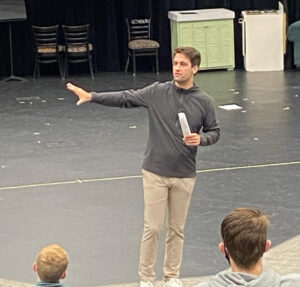
Dr. Goll remarked that “to [him], even though [his] name is on [the degree], it is just a product of so many people and their continued love and support.” According to Dr. Goll, he owes so much of his success to the support he received from coworkers, friends, and especially family, that he – at least partially – owes his success to his community. In fact, Dr. Goll stated that “my hope is that whatever I do, whether it’s here or elsewhere, with this degree, I just want it to be a testament to people’s faith in me and to really be able to use it to serve and love others to the best of my ability.”
Dr. Goll told me that he was especially moved by the presence of his family. His father had recently been diagnosed with cancer, and his family was struggling with the news. Dr. Goll recalled a whirlwind of varying emotions between attaining his doctorate and the news of his father’s condition.
The Role of the Father Figure
Dr. Goll’s father was unfortunately diagnosed with cancer shortly before he acquired his doctorate. This news was shocking to their whole family. Dr. Goll recalled thinking of his father during the final ceremony. “That entire graduation ceremony I honestly just kept thinking about my dad.” His father was an English teacher, and was a great source of inspiration and encouragement for Dr. Goll.
His father was passionate about school, and was an advocate for Dr. Goll in his pursuit of his doctorate. “Particularly as someone who’s not married and I don’t have kids, he was my number one encourager of ‘keep knocking out that degree, keep going after it’”. His father is a forward thinking man, and always reminded Dr. Goll “Your future self in ten years will be so grateful for it.” Dr. Goll mentioned that, despite his poor health, his father always continued to be a fountain of wisdom.
Closure
Once he received his degree, Dr. Goll mentioned that there was an extreme sense of relief. “There was an immediate sense of relief…of like, okay, my name is on the degree. This is over.” This was a herculean task, and his sense of accomplishment at its completion was unparalleled.
He commented that the freedom he has experienced after completing the course has been fulfilling. Now, however, he has time to take care of himself. He specifically mentioned going on runs as a key source of fulfillment after completing his degree.
However, despite the satisfaction of completing this daunting task, Dr. Goll notes that there is an emptiness in its absence. While he does have more time for entertainment, such as reading for pleasure, it is difficult to move on from such a defining experience. For years his EdD program was a focal point of his life. However, now all the time that his doctorate previously consumed is free, a sudden shift that often carries a hollowness with it.
